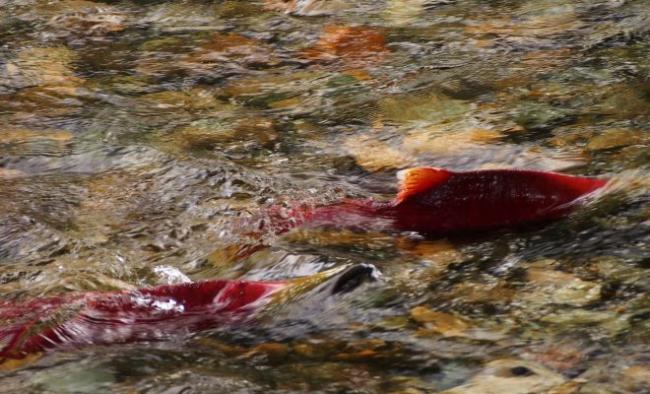Articles Menu

Another example of governments’ “new denialism”: make green promises and mouth/legislate commitments to reconciliation with First Nations, but just keep on trampling both in the service of fossil fuel industry profits.
Dec. 11, 2020
The federally-owned company building the Trans Mountain pipeline is about to begin clearing trees near sensitive salmon habitat along the Brunette River in Burnaby, British Columbia—even though a company executive swore in an affidavit that the fish would be protected, and two government reports in the last two weeks have concluded there’s no likely justification for completing the project.
Private security hired by Trans Mountain Corporation arrived at Holmes Creek on Wednesday, and “logging crews are preparing to cut magnificent cottonwood trees next to a salmon stream full of eggs waiting to hatch,” Dogwood said in an alert to supporters late Wednesday night.
“Trans Mountain Vice President David Safari swore under oath that the company could not cut trees in this area at this time of year because of the risk to fish,” the Victoria-based campaign organization added. “But here they are. Bulldozing unceded Indigenous land and threatening sacred salmon rivers. And for what? To build a carbon bomb of a pipeline experts are lining up to say is no longer needed. And they’re doing it with billions of our tax dollars.”
In a May 11 affidavit addressed to the Canada Energy Regulator (CER), Safari identified August 1 to September 15 as the “Least Risk Fish Window” when the company could clear trees in the area. But on Wednesday, police began clearing protesters from the area as construction work began nearby, North Shore News reports.
“Several environmental activism groups set up a camp in the Brunette River area near the borders of New Westminster, Burnaby, and Coquitlam in late summer,” the News states. “In recent weeks, demonstrators have built a treehouse in one of the trees, intended to house protesters through the winter.”
But “a path to the tree was closed by crews Wednesday morning, with a CN Police Service vehicle parked at that path,” and “more police cars were staged on the other side of the CN Railway tracks,” the paper says. “Crews were seen working down at the edge of the tracks near the camp Wednesday morning, and more work was being done up the hill, a few metres from the camp.”
The news comes less than a month after CBC reported that Burnaby-area streams were seeing a “pretty decent” salmon run this year, after a concerted effort to bring local creeks back from decades of pollution and other damage. “A lot of the streams we saw fish return to are streams where there has been a lot of restoration work unfold over the last number of years,” said local resident Mark Angelo, the chair and founder of World Rivers Day. “So to see salmon return in decent numbers is incredibly exciting.”
Dogwood Campaigns Manager Alexandra Woodsworth said Trans Mountain logging in a sensitive area, at a sensitive time of year, is precisely what Safari said would not happen. “Riparian zones like Holmes Creek are protected by rules set out in the Fisheries Act, which raises some pointed questions for Trans Mountain and federal watchdogs,” she told The Energy Mix.
“Is Trans Mountain in violation of Department of Fisheries and Oceans rules? Or are the agencies responsible for protecting fish—like DFO and the Canada Energy Regulator—knowingly allowing Trans Mountain to break the rules?” she asked. “Either way, it is unconscionable that the government is risking our land, water, climate, and billions of dollars to build a pipeline that experts are lining up to say is no longer needed.”